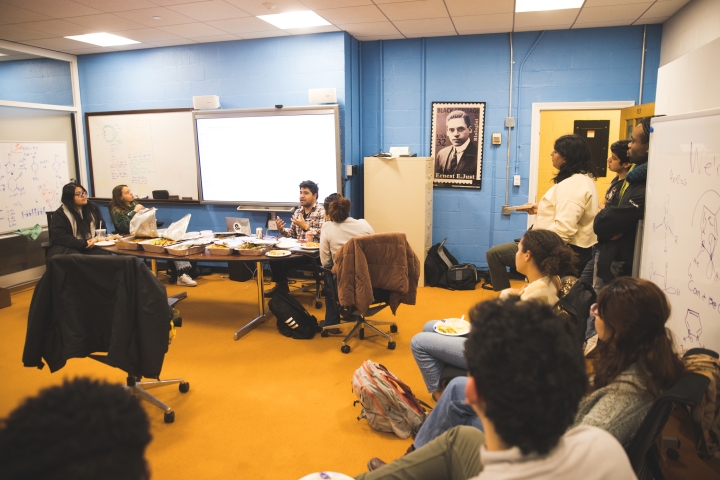More than 20 undergraduates, graduate students, and faculty members turned out on a chilly Wednesday evening last month to talk about mentorship and socialize over dinner from a Hanover restaurant.
“Whether you’re an undergraduate, graduate student, postdoc, or faculty member who is a systemically underrepresented and racialized minority, the E.E. Just Program is creating space for you to thrive within Dartmouth’s STEM ecosystem,” says program director Craig Sutton, an associate professor of mathematics.
Among its goals, the E.E. Just Program seeks to increase the number of systemically underrepresented minorities at Dartmouth pursuing degrees and careers in STEM disciplines. Over the years, it’s done exactly that.
“The E.E. Just Program has a tremendous impact on students from underrepresented populations who arrive at Dartmouth interested in studying STEM,” says Faculty of Arts and Sciences Dean Elizabeth F. Smith. “Students who participate in the E.E. Just Program are twice as likely to graduate with a STEM degree as those who do not.”
From graduate student fellowships to a series of “on ramps” for undergraduates, the program aims to meet students where they are, and to ensure that those who want to pursue STEM studies have the community and support they need, Sutton says.
Students are welcome to engage in any or all of the offerings. For undergraduates, those include a pre-orientation program called Dartmouth Adventures in STEM, an internship at the Marine Biological Laboratory at Woods Hole, summer research internships for rising second-year students, and research fellowships for third- and fourth-year students who may be considering graduate school.
“I’ve designed the current incarnation of the E.E. Just Program around the idea of providing community, opportunity, and mentorship through critical transition points along the developmental arc of a scientist,” Sutton says.

Sometimes that starts with a student’s first few days on campus.
Hope Hall ’26, who is from Baltimore, came to Dartmouth planning to study biomedical engineering. Then she did the five-day Dartmouth Adventures in STEM pre-orientation program.
After visiting several departments, and hearing from professors in different disciplines about their fields, her interest became “a little bit more varied,” says Hall, who is now leaning toward electrical engineering. “It showed me how much you can study here.”
’Very much a bonding experience’
Mentoring in the E.E. Just Program takes a variety of forms, ranging from fellows and interns’ work with faculty members, to peer-to-peer mentoring, to informal networks that spring up among community members.
Students attending the Adventures program are mentored by second-, third- and fourth-year undergraduates. That was a highlight for Kimberly Girola-Guzman ’26, who completed the pre-orientation program last summer and plans to take pre-health courses.
The E.E. Just summer interns and undergraduate fellows “were showing us their labs and their research and helping us navigate Dartmouth,” says Girola-Guzman.
“We went into town, we watched movies, and it was very much a bonding experience,” she says. “The friends that I made in that program, we’re all still very close, which I really, really love.”
Something ‘we’re not taught in high school’
Graduate fellows provide near-peer mentorship for undergraduates and new graduate students. Juan Mercado Del Valle, an E.E. Just graduate fellow in molecular and systems biology, says the chance to support budding scientists was a big draw.
For him, the most important part of the fellowship has been “being able to meet so many people with different passions and interests and knowing that I have been able to help them by just being there.”
Graduate fellows lead the jam sessions, which take place in a bright blue room in Wilder under the gaze of a portrait of Ernest Everett Just, Class of 1907, the pioneering Black cell biologist who inspired the program. The topics range from ideas students encounter in their coursework or research to professional development training, such as what to put in a resume.

Ashley Laveriano ’24, an undergraduate research fellow in biological sciences, says a recent training illustrated just how on-point the sessions are.
“We did CVs and how to tailor your CV to a graduate program,” says Laveriano, an environmental studies major from Newark. “It’s something that we’re not taught in high school.”
Bringing it all together
Victor Sanni ’24, an E.E. Just undergraduate fellow from Abuja, Nigeria, is among the many students who make a point of staying involved with the program, attending the weekly jam sessions, studying together, and sharing meals.
“The most important thing the E.E. Just Program gives you is community. You meet other people like you, other underrepresented minorities in STEM who are each working on different projects,” says Sanni, a computer science major and engineering minor. “You meet people that you just learn so much from.”
He’s made a lot of friends through the program and appreciates the “academic side” of what it offers, such as workshops and access to mentors, Sanni says. “The E.E. Just community brings all that together.”
**
The E.E. Just Program is accepting applications for the Undergraduate Fellowship through April 7. The deadline for applying to the 2023 summer internship program is April 14.
